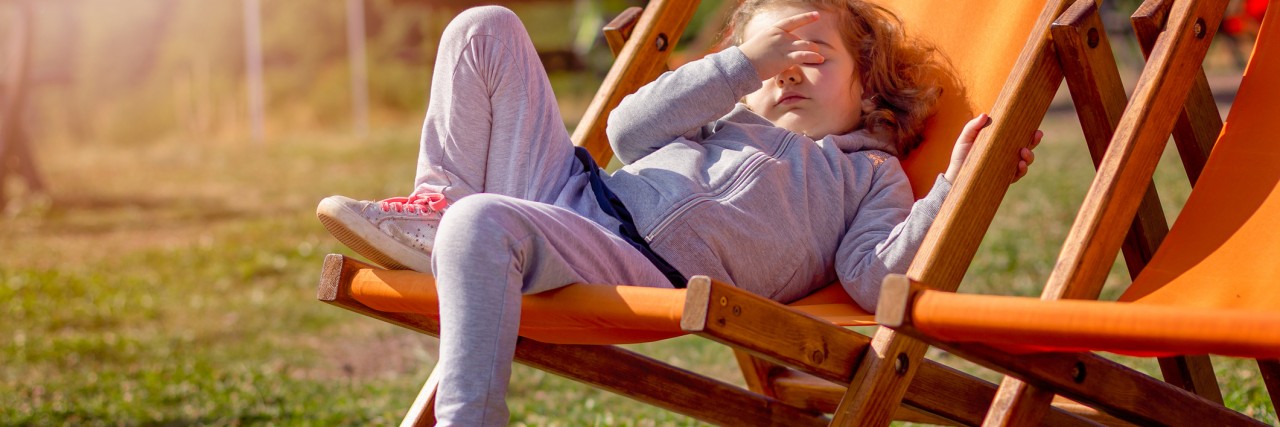You’re at the park on a beautiful summer day, sitting on the bench blissfully watching your kids go down the slide. Then it happens. That kid arrives. Immediately that kid is bumping into your toddler on the stairs, climbing things that aren’t for climbing, and hastily skipping to the front of the line of kids waiting for the slide. “So much for that moment of peace,” you think as you approach your children in support. “What is wrong with that kid?” you find yourself wondering in frustration.
You see, when things don’t go the way we’d like them to, we find ourselves frustrated. When our kids’ social outings don’t play out the way we’d like and situations out of our control ensue, it creates unease. I can empathize with this feeling, as I have experienced similar sentiments when challenging situations arise unexpectedly. After all, we are only human, and this parenting thing is exhausting.
Even though that kid is frustrating to deal with at times, I’m seeing that kid in a whole new light these days. This happened somewhere within the plot twist of coming to the realization that I am raising that kid. It happened when my daughter outgrew her toddler years, yet many of the socially inappropriate and challenging behaviors continued. It happened as we learned her nervous system wasn’t responding properly, and therefore she was constantly struggling to process sensory input (all information going in and out all day).
Sensory processing disorder (SPD), attention-deficit/hyperactivity disorder (ADHD), autism spectrum disorder (ASD) or any other “invisible” challenges that kid faces doesn’t get left at home during an outing to the park. That kid still struggles with interpreting the body language and communication cues of the kids around him. That kid still struggles with waiting in line because of extreme impulsivity. That kid still struggles with listening to adults and peers because her nervous system is doing all it can to hold it all together.
That kid is doing the best they can with what they have at the park.
So how can we support that kid and their family at the park (I know you want to because you are kind and therefore want to model kindness and acceptance for your child)?
Give it a moment to pass. Is it really hurting or disrespecting our child, or just annoying us? Many times things that trigger us as adults aren’t bothering our children in the least. Children have an innate understanding that we are all different and will often be accommodating and understanding in regards to different behaviors. Give the parent of that kid a chance to step in and redirect them if warranted. The parents of that kid are often hyper vigilant to the implication of their child’s behavior.
Support the child with compassion. Again, every child is doing the best they can at any given moment, and that kid is no exception. No child desires to be seen in a negative light by adults or peers. If a child needs correction and their caregiver is unaware, you have the opportunity to be a source of light for a child who lives in a world of constant disapproval and criticism. Instead of assuming the worst, assume the best. Interact with the child using respectful guidance, and speak to them as if you believe they are capable and willing to learn. Please speak to them the way you’d like to be spoken to.
Nurture acceptance in your child. If there’s a negative situation that can’t be aided, take some time to talk with your child about differences. Let them know while that kid‘s behaviors may be inappropriate at times and not how you do things in your own family, that child may have a brain or body that works differently than ours. Let them know we all struggle sometimes and this child is struggling today. Finally, let them know even though a child may not look or act like we do, they’d probably love to have a friend today at the park.
It’s a brain-based response to experience an emotional reaction to situations that are unexpected or that we perceive to be a threat to our child, but what we do next can go beyond just a reaction. It’s easy to extend understanding and compassion to the calm happy child at the park. But I know you can go beyond that. I know as a parent you understand how that kid has amazing positive attributes that likely won’t get showcased that afternoon at the park, and that they are no less deserving of your patience and understanding (and are in fact more in need of it).
I’m confident the world would be a better place if we could all extend a little more patience, kindness and acceptance to those who are struggling, so why not start today, at the park?

